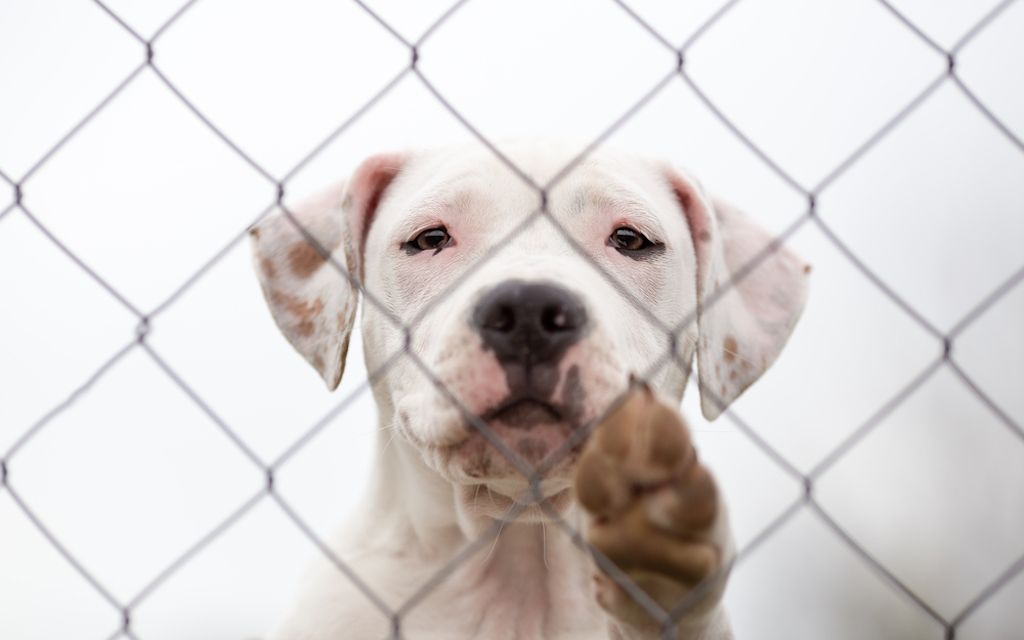American Bully Dogs Will Be Banned in the U.K.—Could the U.S. Follow?

If you’re a dog lover, then you’ve probably had a few affectionate moments with breeds like Pit Bulls, Bull Terriers, and Bulldogs. The bully breeds, which have muscular, athletic builds, are some of the most common that are found in shelters—and therefore, they’re also some of the most populous at the dog run. But since the 1980s, these animals have been the target of breed-specific legislation (BSL), or laws that aim to regulate or outlaw them. That’s not only the case in the U.S., either. In the U.K., the American XL Bully may soon be banned throughout the country. Read on to see what led to the ban, and whether the U.S. could take the same path.
RELATED: 14 Hardest Dog Breeds to Own, Doggy Daycare Worker Says.
American XL Bully dogs will be banned in the U.K.

On Sept. 15, British Prime Minister Rishi Sunak announced a plan to ban American XL Bully dogs from the U.K. In a statement, he called the breed a “danger to our communities, particularly our children.” The law would make it an offense to own, breed, gift, or sell a Bully, and may also give authorities permission to confiscate animals, even if they do not have a record of aggression, according to the Des Moines Register.
Sunak said the first step in implementing the ban would be to define the breed of dog that needed to be banned, as the American XL Bully is not currently a breed defined by the law or by the Kennel Club in Britain. (The breed is also not defined by the American Kennel Club in the U.S.)
“We will then ban the breed under the Dangerous Dogs Act,” he said. New laws will be in place by the end of the year, Sunak stated.
The American XL Bully will join four other dog breeds that are illegal in the U.K.: the Pit Bull Terrier, the Japanese Tosa, the Dogo Argentino, and the Fila Brasileiro, per Sky News.
RELATED: The 8 Most Popular Dog Breeds in the U.S., New Study Says.
The ban comes after a series of attacks.

Sunak explained that the ban comes on the heels of recent dog attacks, including a fatal one on Sept. 14. Another recent incident, which was caught on camera, involved an 11-year-old girl in Birmingham, England, who was injured. After attacking her, the dog chased a man into a gas station plaza and bit his arm and shoulder, according to The New York Times.
“I share the nation’s horror at the recent videos we’ve all seen,” said Sunak. “It’s clear this is not about a handful of badly trained dogs; it’s a pattern of behavior.”
The effectiveness of breed-specific legislation is up for debate. After conducting a study of human fatalities from dog bites, the Centers for Disease Control and Prevention (CDC) decided to strongly oppose BSL. The center cited the inaccuracy of dog-bite data and the difficulty in identifying dog breeds, according to the ASPCA.
Animal experts say it often comes down to a pet’s owner.
“Regardless of the legal landscape, the most important aspect of dog ownership is responsible pet ownership,” says Kathryn Rosalie Dench, DVM, veterinary surgeon and advisor to Gentle Dog Trainers. “This includes proper training, socialization, and supervision of dogs to prevent incidents, regardless of their breed.”
Bully breeds are banned in some cities and states.

In the U.S., BSL depends largely on where you live and can vary from state to city to municipality. Changes in BSL happen often in the U.S., though not uniformly throughout the country.
“Some states, like Massachusetts, Utah, and Rhode Island, have anti-BSL laws which prohibit the ban on breeds; others, however, maintain their breed-specific bans,” says Min Hwan Ahn, a lawyer at the Law Office of Ahn & Sinowitz in Philadelphia. “It’s a mixed bag, really, reflecting the ongoing debate on the issue at hand.”
If you’re unsure of legislation in your area, Rosalie Dench suggests checking with your local veterinary associations or government websites to remain up to date on recent changes or proposed legislation where you live.
RELATED: Dating App Is Righteously Banning Users Who Ghost Their Dates.
But a country-wide ban is extremely unlikely.

While BSL exists across the U.S., Ahn says a country-wide ban, like the one that will occur in the U.K., is “highly unlikely.” The reason for this is that our federal government gives states significant authority to enact their own laws regarding animal control and public safety.
“The federal government can certainly establish national policies on certain matters, but historically, it has typically deferred to states on issues related to animal control, including breed-specific bans,” he explains. “Thus, the likelihood of a nationwide breed-specific ban occurring seems remote, given this longstanding tradition of state discretion.”
He says that if BSL were to go national, there would be significant pushback.
“Any decision to implement a national breed ban would likely lead to contentious debates, both in Congress and in public discourse,” he says. “While changes can and do occur, it’s more probable that they’ll happen at individual state levels rather than nationally.”
RELATED: For more up-to-date information, sign up for our daily newsletter.